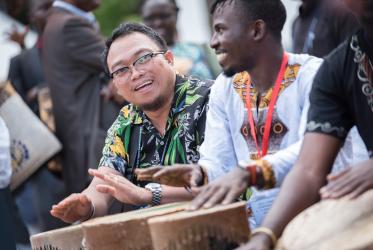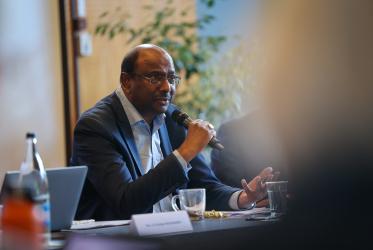In the aftermath of an international consultation on the engagement of Christians in ministries of service, relief and development, Cuban theologian Reinerio Arce agreed to be interviewed on the continuing need for “diakonia” as an essential ministry of the ecumenical movement. Dr Arce, president of Matanzas Theological Seminary and moderator of the Presbyterian-Reformed Church in Cuba, was a participant in the Global Consultation on Prophetic Diakonia in Utrecht, the Netherlands, from 13 through 15 December 2010.
Diakonia, or the diaconal ministry of the church, has been defined as “the responsible service of the gospel by deeds and by words performed by Christians in response to the needs of people”. The 9th Assembly of the World Council of Churches in Porto Alegre, Brazil called for a series of consultations on reorganizing the coordination of service ministries sponsored by churches and church-related agencies. The Utrecht consultation was the second in a series that began in May 2009 at Bucharest, Romania.
Discussion in Utrecht commenced with consideration of a “mapping exercise” that was conducted to provide a scientific survey of churches’ world-wide involvement in service ministries. On the basis of this data, participants discussed strategies for more effective administration and networking to make the best use of available resources. Finally, plans were made to follow up the findings of the two consultations.
Dr Arce, you had the opportunity to attend both global consultations on diakonia organized by the WCC after the 2006 Porto Alegre assembly. What were your impressions?
The first consultation was organized in Bucharest, Romania in May of last year, hosted by the Romanian Patriarchate. In that meeting we re-launched the diaconal work of the WCC, reflected on our common understanding of diakonia on the basis of practical experiences at the local level and further facilitated theological reflection and common action on the diaconal work of the churches.
The meeting we just held in Utrecht was organized in coordination with the Interchurch Organization for Development Cooperation (ICCO) and Kerk in Actie of the Netherlands. We met on 13-15 December 2010. The objectives of the consultation were twofold: on the one hand, we discussed the results of a mapping survey which was implemented in 2010 among the WCC member churches; and on the other hand, we sought better ways to organize the WCC’s work in this area, designing the training strategy on prophetic diakonia, developing networks of ecumenical resource-sharing among the member churches and enabling theological reflection on diakonia.
I have a very positive impression of the whole process. I think that a lot has been accomplished between consultations.
How was the programme structured in this most recent consultation?
We met over a period of three days. The first day, we discussed the themes “Prophetic Diakonia in the WCC” and “Theological Reflection on Diakonia” from different perspectives. A lot of time was devoted to discussion of the results of “mapping” diakonia. On the second day, we had many presentations on “Practices and Training on Diakonia” at the global, regional and local levels. The final day, we advanced our conclusions and ideas for follow-up. The group discussions helped us to deepen our reflections from diverse points of view. The morning prayers were very inspiring.
In the presentations and discussions, we reaffirmed the notion of prophetic diakonia, by which we acknowledge that God sends us out in mission to bring the good news to the poor and oppressed, in word and in deed. Faithful to this call, we try to serve human needs, focusing on the marginalized, the “least of these”, not only by comforting them but also by addressing the root causes of their pain, sorrow and shortages. This ministry of prophetic diakonia seeks to confront the powers of this world that lead to violence, exclusion, death and destruction, and it calls for the transformation of unjust structures and practices into God’s kingdom of justice, with fullness of life for all and for creation.
What were the main outcomes of the Utrecht meeting?
We reaffirmed the three pillars of the WCC’s role as facilitator of the diaconal mission of its member churches, in collaboration with other sister organizations; namely: training, theological reflection and networking.
I am particularly interested in further promoting diakonia as part of the curriculum for theological education. At the Matanzas Theological Seminary in Cuba, we are in the process of launching a new programme on diakonia in coordination with the Martin Luther King Centre in Havana. In our country the churches are playing a more active role serving the people in need at this moment when our economy is shifting increasingly; we need to build capacity for this task. For this work, the cooperation with the Cuban Council of Churches, the Latin American Council of Churches and the World Council of Churches is critical.
Any final word?
Yes, I am grateful to God, to the WCC and to ICCO / Kerk in Actie for this experience. We look forward to continuing cooperation in the follow-up, in order to improve the quality of life among our people.
Read the article on “Diakonia” from the Dictionary of the Ecumenical Movement








